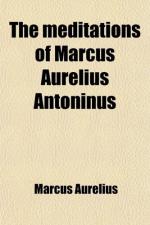|
This section contains 14,786 words (approx. 50 pages at 300 words per page) |

|
SOURCE: “Marcus Aurelius: Rational Asceticism and Social Conservatism” in Subversive Virtue: Asceticism and Authority in the Second-Century Pagan World, The Pennsylvania State University Press, 1995, pp. 21-52.
In the following excerpt, Francis contends that Aurelius's practice of asceticism was cerebral and notably unconcerned with the physical.
In the second century, asceticism ascended to the very apex of Roman society. In contrast to the philosophy-hating tyrannies of Nero and Domitian, Marcus Aurelius ruled with the reputation of a philosopher-king1 and, to a certain extent, that of an ascetic. Although much has been written examining the precise nature of the emperor's philosophical tenets, the character of his asceticism has remained ill-defined and in need of detailed study.2
Paradoxically, Aurelius's reputation and that of the entire Antonine period make this task more difficult. Gibbon's characterization set the tone for most of modern scholarship: “But his life was the noblest commentary on the...
|
This section contains 14,786 words (approx. 50 pages at 300 words per page) |

|


